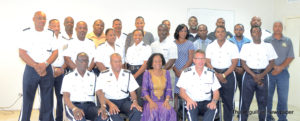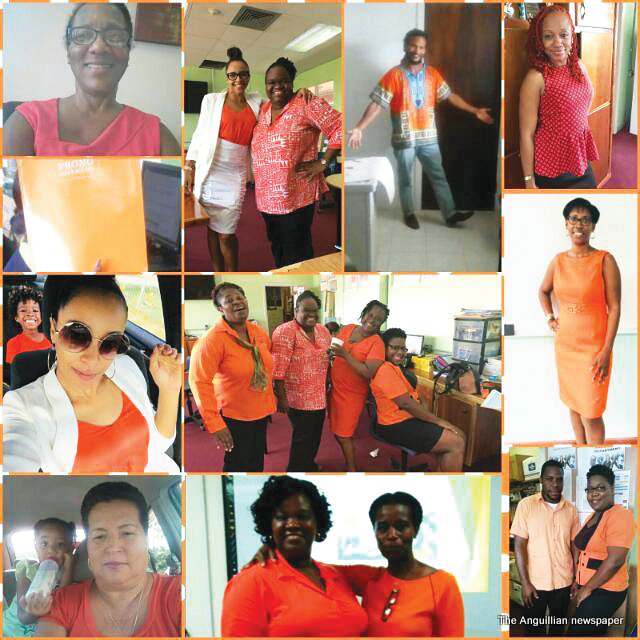
As part of the RAPF’s forty-six anniversary observance and its 2018 annual Police Week of activities, members of the Royal Anguilla Police Force benefited from a special lecture presentation on Monday morning, January 29th – facilitated by Dr. Phyllis Fleming-Banks — Manager of the University of the West Indies open campus.
The lecture was moderated by Inspector Crispin Gumbs. This year’s Police Week theme is: “Strategizing our Approach; Demonstrating Resilience in Times of Adversity”, and in presenting Dr. Fleming-Banks, Commissioner of Police Paul Morrison said: “the force realizes how important it is to continually develop itself as best as it can to meet the challenges of the job that it does. Thus, it is with this view that Dr. Fleming-Banks will be lecturing on the importance of continued professional development.”
Officer PC 94, Randy Dick, formally introduced Dr. Fleming-Banks by aptly stating her professional credentials as “one who continues to influence lives and impact institutions by transforming environments whenever she is given the opportunity.”
Dr. Fleming-Banks, upon greeting the officers, began by giving a synopsis of the RAPF since its inception in 1972, but even went back further to the Anguillian way of life, prior to the Anguilla Revolution of 1967, in order to show how essential it is for the officers to be continually developing in their careers to meet the evolving demands of changing times. Throughout the course of the lecture, Dr. Banks emphasized how essential it is for members of the RAPF not only to be well trained as police officers but to be constantly developing on that training.
She reflected: “On January 29th 1972, forty-six years ago to the day, today, the Anguilla Police Force was established comprising of 18 Anguillians, under the command of Col. Claudius M. Roberts, MBE, CPM. In the context of the new Anguilla Police Force back then, skilled human resources were paramount to the emerging new Anguilla. One can only imagine the challenges that the members of the force at that time would have faced. They had to maintain law and order in that very fluid situation.
“As we fast forward to 2018, we have now what is known as the Royal Anguilla Police Force, an institution which, up until 2015, had boasted of having all local Police Chiefs or Police Commissioners. But indeed the times are changing. With perfect hind-sight, we may have an idea of what the professional developmental needs were for the members of the police force in 1972. But what are they for you in 2018, now, in an age when increasing globalization, super-technology, cybercrime, white collar crime, gang violence, youth on youth violence, domestic partner violence, community mistrust, increasing public expectations, and other such factors, remind us that we are part of a world – one in which you as the RAPF must be able to cope.
“I would hope that it is your recognition of these challenges that is charting your strategic development plan and guiding your focus for your own ‘continuing professional development’ as part of your 46th anniversary and police week 2018. But what is Continuing Professional Development (CPD)? One source of research describes it as ‘life-long learning; an on-going process which continues throughout a professional’s career.’ Another source says it is ‘simply a method of ensuring that you achieve the right abilities to do your job and maintain and enhance your expertise.’ Yet another source states, ‘Continuing Professional Development embraces everything you do to improve your job performance and your life-long employability.’ This means that you should aim to develop yourself tactfully, for in the future any of you can have the potential to become the Commissioner of Police.
“CPD is important because it ensures that you are competent in your profession. Any continuing professional development activity will help to maintain your knowledge and enhance your skills. Every time you go to a training session that is what you should expect. It is very wide ranging though, to include those informal unplanned and spontaneous learning events that can be of benefit to your professional development as well.
“CPD for you means that opportunities are provided as a means whereby you can keep in sync with the changes that are happening in your field with your kind of expertise. CPD enables you to broaden your skills and to be more effective on what you do.
“According to the College of Policing, ‘Continuous Professional Development is a chore life-long learning strategy that ensures an individual consistently meets the competency requirement of their role, and is continually seeking to further enhance performance throughout their career. It is a range of learning activities through which you can maintain or enhance your capacity to practice legally, safely ethically and effectively.’
“The concept of CPD is not a new one. It has to be something in your capacity that you are already doing. And due to the nature of your profession, it requires that most of you undertake these continuous professional development training activities as a matter of course. What is noteworthy is that this kind of development is life-long. So remember, when you complete your basic skills training, whether you return from Barbados after your fist six-month training program, or when you receive that UWI degree, it is important to celebrate these achievements.”
Remarkably, Dr. Fleming-Banks had this caution to give to the officers: “Yes, it is important to celebrate where you are, and what you have accomplished within the RAPF. However, the experts warn that you should not sit patting yourselves on the back for too long, because you will soon be lagging behind your colleagues. And the same is true for those who have many years of experience in the force. While your experience is important and must be respected, you cannot sit back and laud it over the new recruits pointing out how many years of experience you have in the force, and all that you have been through. For, if those years have not included meaningful professional development on a continuous basis, in this fast-pace changing world, you will run the risk of becoming the dinosaurs of your profession.”
Throughout the session, Dr. Fleming-Banks alluded to motivational scoops from many professionals in the field of police work, relative to need for on-going professional development. Such professionals included Fred Leland Jr. and Col. John Boyd.
Finally, in closing her closing remark, Dr. Fleming-Banks noted: “Every officer has a basic responsibility to study the profession. Each one of you is responsible for your own professional development. Your organization might be responsible for only a fraction of your professional development; but the responsibility is yours to advance yourself in your own professional development.”
A jovial and admirable vote of thanks was rendered by Officer PC 10, Paul Trim.








